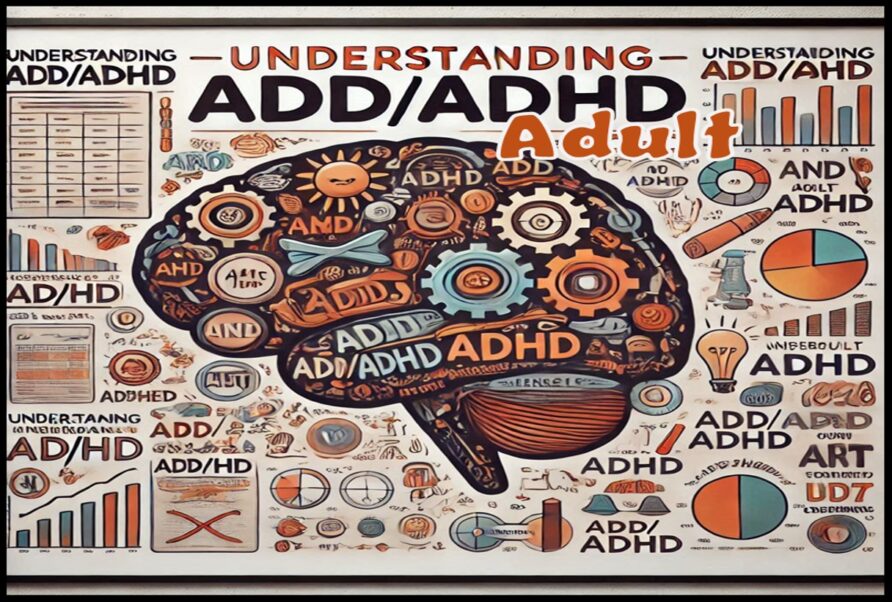
Have you ever found yourself sitting in a business meeting at work, losing focus even though the subject is interesting? Or perhaps you’re reading the latest James Patterson novel, and just as you reach the good part, you start watching the TV series “Smallville.” Maybe you go into a grocery store for one item and come out with a whole cart full of things you could have postponed purchasing. Lastly, you might have been tasked with making a t-shirt quilt for a dear friend, only to now be bombarded with five different projects. Let’s face it, as adults, we are constantly loaded with multiple tasks and responsibilities throughout the day, making it nearly impossible to finish them all or even in a timely fashion. But what if there was something else going on? What if you’re suffering from Adult ADD/ADHD?
*Disclaimer: I am not a doctor, and this blog is solely for entertainment purposes, and based on my personal experience with Adult ADD. These are the techniques I have used to help me cope. If you believe you may have ADD/ADHD, my only advice is to visit your primary doctor for a proper diagnosis and care management.
Adult Attention Deficit Disorder (ADD) and Attention Deficit Hyperactivity Disorder (ADHD) are often misunderstood. While many associate these conditions with children, adults can also experience symptoms that impact their daily lives. Let’s dive into what adult ADD/ADHD looks like, how to manage it without medications, the importance of consistency in routines, and when to seek professional help.
Symptoms of Adult ADD/ADHD
Adults with ADD/ADHD may exhibit a variety of symptoms, including:
–Inattention: Difficulty focusing on tasks, frequent daydreaming, and trouble organizing activities.
-Task Jumping: Going from one task after another and not focusing on one activity.
–Hyperactivity: Restlessness, fidgeting, and an inability to stay seated for long periods.
–Impulsivity: Making hasty decisions without considering the consequences, interrupting others, and difficulty waiting for one’s turn.
These symptoms can affect work performance, relationships, and overall quality of life. Recognizing these signs is the first step toward managing the condition effectively.
Managing ADD/ADHD Without Medications
While medications can be beneficial, some adults prefer to manage their symptoms through non-pharmaceutical methods. Here are a few strategies:
- Mindfulness and Meditation: Practicing mindfulness can help improve focus and reduce impulsivity. Techniques such as deep breathing and meditation can calm the mind and enhance concentration.
- Exercise: Regular physical activity boosts the production of neurotransmitters like dopamine, which can help improve attention and reduce hyperactivity.
- Diet: A balanced diet rich in omega-3 fatty acids, lean proteins, and whole grains can support brain health and improve symptoms.
- Sleep: Ensuring adequate sleep is crucial. Establishing a regular sleep schedule can help regulate mood and improve focus.
- Behavioral Therapy: Cognitive-behavioral therapy (CBT) can provide tools to manage symptoms, develop coping strategies, and improve organizational skills.
*The Importance of Consistency
Consistency is key when managing ADD/ADHD. Establishing and maintaining routines can provide structure and reduce the chaos that often accompanies these conditions. Here are some tips:
-Daily Schedules: Create a daily schedule that includes time for work, exercise, meals, and relaxation. Stick to this routine as closely as possible.
-Task Lists: Use to-do lists to keep track of tasks and prioritize them. Breaking tasks into smaller, manageable steps can make them less overwhelming.
-Reminders: Set reminders for important tasks and appointments. This can be done through phone alarms, Google Calendar, sticky notes, or digital apps.
–Do not procrastinate: Procrastination can lead to tasks piling up, making them difficult to complete. Dealing with procrastination involves breaking tasks into smaller, manageable steps to make them less overwhelming. Setting specific deadlines and using tools like calendars or to-do lists can help keep you on track. It’s also important to create a distraction-free environment to maintain focus. Lastly, rewarding yourself for completing tasks can provide motivation and reinforce positive habits.
Supportive Family and Friends
Friends and family can play a crucial role in supporting someone with ADD/ADHD by offering understanding and patience. They can help by creating a structured environment, setting clear expectations, and providing gentle reminders for tasks and appointments. Encouraging open communication and actively listening to their experiences can make a significant difference. Additionally, celebrating small achievements and offering positive reinforcement can boost their confidence and motivation.
Can ADD/ADHD Be Cured?
Currently, there is no cure for ADD/ADHD. However, with the right strategies and support, individuals can manage their symptoms effectively and lead fulfilling lives. It’s important to remember that each person’s experience with ADD/ADHD is unique, and what works for one person may not work for another.
When to Check In with Your Doctor
If you suspect you have ADD/ADHD or if your symptoms are significantly impacting your life, it’s important to seek professional help. A healthcare provider can offer a proper diagnosis and discuss treatment options, which may include medications, therapy, or a combination of both. Regular check-ins with your doctor can help monitor your progress and make necessary adjustments to your management plan.
Conclusion
While living with adult ADD/ADHD can be challenging, understanding the condition and implementing effective management strategies can make a significant difference. Remember, you’re not alone, and with the right support, you can navigate the complexities of ADD/ADHD and thrive. Check out the list below for possible careers and activities for people who deal with ADD
Possible Careers for individuals suffering from ADD/ADHD
Here are some careers that might be well-suited for individuals with ADD/ADHD. These professions offer a range of environments and tasks that can help keep individuals engaged and motivated.
- Creative Fields: Graphic design, writing, photography, and other creative professions can be engaging and allow for flexibility.
- Entrepreneurship: Running your own business can provide the autonomy and variety that many people with ADD/ADHD thrive on.
- Technology: Careers in IT, software development, and web design can be stimulating and offer opportunities for problem-solving.
- Healthcare: Roles such as nursing, paramedics, and occupational therapy can be dynamic and rewarding.
- Education: Teaching, tutoring, and educational consulting can be fulfilling and allow for creativity in lesson planning.
- Trades: Electricians, carpenters, and mechanics often work on varied tasks that can keep things interesting.
- Sales and Marketing: These fields can be fast-paced and involve a lot of interaction with people, which can be engaging.
- Performing Arts: Acting, music, and dance can be great outlets for creativity and energy.
- Fitness and Sports: Personal training, coaching, and other fitness-related careers can be physically engaging and rewarding.
- Non-Profit and Social Work: Helping others and working on meaningful projects can be very fulfilling.
Possible enjoyable activities for people suffering with ADD/ADHD
Here are some enjoyable activities that can be particularly engaging for individuals with ADD/ADHD: These activities can help manage symptoms and provide enjoyable ways to stay engaged and focused.
- Outdoor Activities: Hiking, biking, and running can help burn off excess energy and improve focus.
- Creative Arts: Painting, drawing, and crafting can provide a creative outlet and help with concentration.
- Music: Playing an instrument or listening to music can be both relaxing and stimulating.
- Sports: Team sports like soccer, basketball, or individual sports like swimming and martial arts can be great for physical activity and social interaction.
- Gardening: Working with plants can be calming and rewarding.
- Cooking and Baking: Experimenting with new recipes can be a fun and engaging way to focus attention.
- Puzzles and Games: Board games, puzzles, and video games can help improve problem-solving skills and provide entertainment.
- Yoga and Meditation: These practices can help with relaxation and mindfulness.
- Reading: Finding books that capture interest can be a great way to improve focus and enjoy downtime.
- Volunteering: Helping others can provide a sense of purpose and community involvement.
**Check out this insightful Guidebook from Amazon on ADD for Adults.




Comments